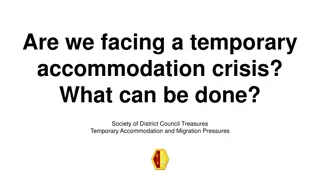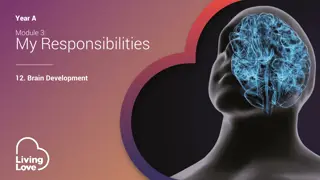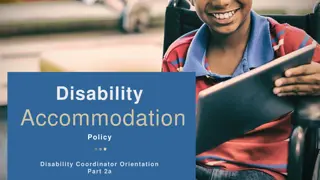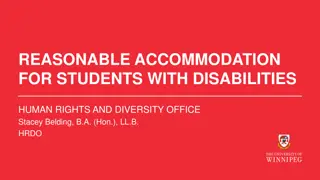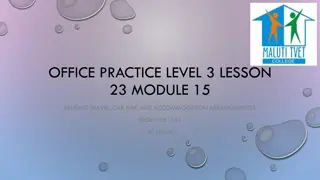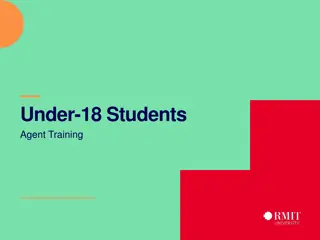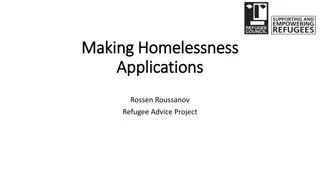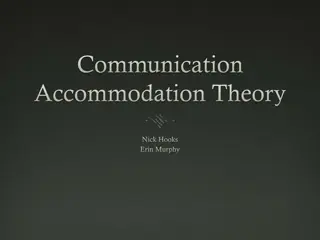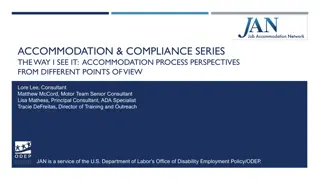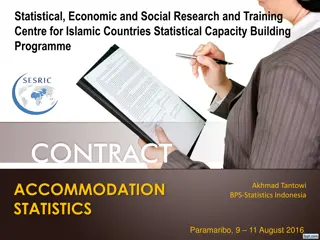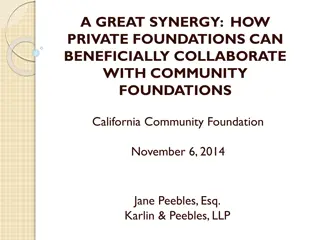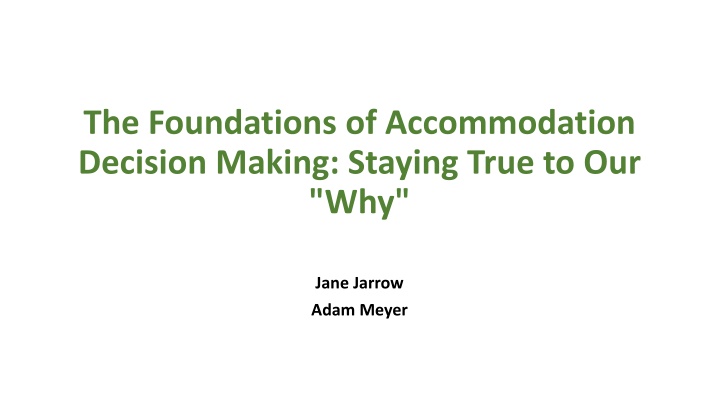
Equal Access and Reasonable Accommodations in Disability Nondiscrimination
Explore the importance of equal access and reasonable accommodations in promoting disability nondiscrimination. Learn about the core principles, responsibilities, and mission for ensuring equitable opportunities for individuals with disabilities, as outlined in Section 504 of the Rehabilitation Act. Discover how to determine and facilitate accommodations effectively to support students in achieving their full potential.
Download Presentation

Please find below an Image/Link to download the presentation.
The content on the website is provided AS IS for your information and personal use only. It may not be sold, licensed, or shared on other websites without obtaining consent from the author. If you encounter any issues during the download, it is possible that the publisher has removed the file from their server.
You are allowed to download the files provided on this website for personal or commercial use, subject to the condition that they are used lawfully. All files are the property of their respective owners.
The content on the website is provided AS IS for your information and personal use only. It may not be sold, licensed, or shared on other websites without obtaining consent from the author.
E N D
Presentation Transcript
The Foundations of Accommodation Decision Making: Staying True to Our "Why" Jane Jarrow Adam Meyer
Reminder of our Core Purpose as Stated in 504 No otherwise qualified individual with a disability in the United States, as defined in section 705 (20) of this title, shall, solely by reason of his or her disability, be excluded from the participation in, be denied the benefits of, or be subjected to discrimination under any program or activity receiving Federal financial assistance Section 504 -- Discrimination Prohibited 104.4(a)
What Does This Mean for Us? Disabled people experience nondiscrimination and equitable access when they are able to: Fully engage and participate in the same activities, campus services, benefits and experiences offered to a person without a disability; Utilize the same information shared with everyone; Have the same opportunity to achieve. Adapted from Section 504, 104.4 Discrimination Prohibited
Equal is a Relative Term Equal access is defined as a relative term. Equal access to what? To the same (equal) opportunity that everyone else has access to in a given situation.
So what is our role? What is our mission? To be advocates for disability nondiscrimination, equal access, and equal opportunity through campus-wide collaboration and the coordination of good design and reasonable accommodations
Determining Equal Access and Reasonable Accommodations
What is Missing Here? From the listserv: A student contacted our office and requested the use of a formula card or a note sheet to be a memory aid for math and science tests. I have never facilitated this accommodation before. How do you set this up so the student can use it for tests?
Three Essential (Linear) Steps to Facilitating Access and Determining Reasonable Accommodations 1. Is this a person with a disability? Physical or mental impairment that substantially limits one or more major life activities 2. Relative to a specific disability, is the requested accommodation (or what accommodations are) logical, reasonable, and necessary to provide equitable access, remove unnecessary academic/institutional barriers, and ensure nondiscrimination? What functional limitations intersect with the environment to create an unnecessary barrier? 3. Determine how/if the accommodation is reasonable within the academic context without altering or lowering academic standards and expectations Conduct a fundamental alteration assessment
1. Is this a student with a disability? Is there a physical or mental impairment ? Is there a substantial limitation in one or more major life activities? Beyond a diagnosis What are the functional limitations at the intersection of the environment? If there is no disability, there is no discrimination on the basis of disability
Quick Scenario Is this a disability? A student is asking for extended time for exams because their primary language is Spanish. The student is running out of time on tests due to it taking longer to process the test questions and to organize thoughts into written responses. The student would like extra time on tests and the ability to test in the test center so as to reduce distractions. No one else on our campus handles these types of requests. Should I go ahead and approve it since it something that we already do for many other students?
2. Is the requested accommodation logical, reasonable, and necessary due to disability? The answer is likely YES when the accommodation addresses any unnecessary barrier within the academic and/or campus environment that interferes with a qualified disabled student's ability to : Fully engage and participate in the same activities, campus services, benefits and experiences offered to a person without a disability; Access the same information shared with everyone; Have the same opportunity to achieve. DUE TO: The intersection of the student s disability with the activity or environment.
No Camera Scenario A student connected with our office has extra time for exams. The student enrolled in their first synchronous online class in which the professor requires that all 25 of the students have their cameras on during the class. The students do not get attendance credit if their cameras are off. The student states that having the camera on and the other 24 people potentially staring at them is exacerbating the anxiety to the point where the student cannot focus on the course content. The student wants the camera off as an accommodation. Should I be approving this as an accommodation?
Functional Limitations Due to the physical or mental impairment, the individual may experience functional limitations. These limitations are a restriction or inability to perform an activity in the same manner or within the same range as might be expected on average due to disability. For Disability Office Purposes: Difficulties the student experiences in relation to participation in the academic program BECAUSE of their disability.
Functional Limitation Examples Blind Student Disability: Cannot See Functional Limitation: Cannot read standard print in a textbook or on a screen; unable to observe what others can observe through vision ADHD Disability: Difficulty maintaining attention, focus, and concentration on a task Functional Limitation: Cannot maintain attention, focus, and concentration for as long as other students, which impacts the ability to take adequate notes during class or to take a test for the same amount of time given to other students
3. Determine how/if the accommodation is reasonable within the academic context. Many accommodations identified as reasonable due to a disability will be reasonable within the course Some accommodations will always need to be considered on a case- by-case basis Flexible attendance Alternatives to presentations Use of calculator Memory aid Extra time for assignments Some accommodations may be a fundamental alteration in light of program or course learning objectives
When Is a Course-by-Course Assessment Necessary? When we anticipate that Essential program requirements Specific Course requirements Course Learning Outcomes/Objectives General Academic Expectations Overall Academic Experience could be fundamentally compromised if the tests, activities, materials, or policies are accommodated/adjusted in some manner in the specific instance
Alternative Presentations A student who has a speech disability has been approved for an alternative to presentations. This student is enrolled in an Introduction to Communication course where all students need to give presentations. The student wants to use the accommodation and not give presentations. I have not had this request before. Should I tell the professor that the student should not have to do presentations?
Your Turn! What scenarios or situations have you encountered where we could talk through this model and how to apply the concepts?
Three Essential (Linear) Steps to Facilitating Access and Determining Reasonable Accommodations 1. Is this a person with a disability? Physical or mental impairment that substantially limits one or more major life activities 2. Relative to a specific disability, is the requested accommodation (or what accommodations are) logical, reasonable, and necessary to provide equitable access, remove unnecessary academic/institutional barriers, and ensure nondiscrimination? What functional limitations intersect with the environment to create an unnecessary barrier? 3. Determine how/if the accommodation is reasonable within the academic context without altering or lowering academic standards and expectations Conduct a fundamental alteration assessment
Extended Admissions Deadline A student is filing complaint of denied accommodations for extended deadline for program application. The facts shared to us are as follows: 1. A student has applied to a graduate program. This program requires the completion of a GRE exam as part of the application. 2. Student had contacted GRE to request testing accommodations and reports they were approved. 3. Student is a prior student of our institution and was registered with the Disability office. During the application process for the graduate program, voluntarily disclosed that she had a disability to the graduate admissions office (it was not a question that was part of the application). 4. Student requested from the graduate admissions office for an accommodation to extend the deadline for application completion to allow them more time to complete the GRE. The student said the GRE with accommodations could only be taken at certain times and could not be completed by the time of the admissions deadline. 5. Graduate admissions is not granting the extension and the student has filed a complaint for disability discrimination. Is this correct? Is there something the university in the various offices have missed or not considered? Is there a time where extending application due date/deadlines are deemed reasonable accommodations or are such requests seeking preferential treatment?
Extended Deadlines for Assignments Recently, we have been receiving a lot of push back from instructors for students with accommodations for homework extensions. Each instructor seems to have their own idea of what an accommodation looks like for their class. For example, one instructor allows students to drop the two lowest homework scores so this meets the student's accommodations. Another instructor states that the homework is turned in (let's say on the 2/3, then answers are publicly posted to all students the next day (2/4) so all students can prepare for the test on (2/5). In this case, the instructor states allowing the accommodation fundamentally alters his course so it cannot be provided to the student. We have tried to explain that this scenario is not an example of a fundamental alteration of a course. The instructor is pushing back, so I'm hoping someone in this group can assist with a better explanation of when an accommodation would be a fundamental alteration of a course.
Music During Exams We are a small college, less than 4000 students usually, and allowing music while testing has not been implemented before on our campus. We have a student who has requested music as accommodation because it helps the student to relax while managing ADHD and anxiety symptoms during an exam. Is this accommodation reasonable?
Evening Exam for Day Course I am working with a student with ADHD who is enrolled in a 10:00 a.m. math class. This course has 9 sections with 325 students enrolled in total. To maintain test integrity, all of the sections take four exams during the semester at 8:00 p.m. with a 75-minute standard test time. This allows all students in all sections to test at the same time on the same day. The campus testing center closes at 9:30 p.m. Most students with extra time accommodations may need to start as early as 7:00p.m. to have all of their extended time before the center closes at 9:30p.m. In this case, the student does not want to test at 8:00p.m. because ADHD medication is no longer effective at the end of the day. On the days of the test, the student is done with classes at 3:00p.m. and would like to start the test by no later than 3:30p.m.. The professors across all sections do not want any student to take the test at an alternative time to maintain test integrity. Thus, there is resistance to the student starting the test at 3:30p.m. since the student would be done before 8:00p.m.
Personal Care Attendant We have several students on the Autism Spectrum for whom emotional regulation is extremely difficult and as a result, creates disruptions in the classroom or during other programs and activities of the college. In high school, these same students had one-on- one paraprofessionals to redirect their behavior and enable them to participate in class. Aside from personal care attendants (PCA) for students with physical needs, we have not allowed this for behavioral accommodations. We expect students to meet the same behavioral standards as any other student. I am struggling with this today. I mean, of course students on the spectrum need to meet the behavioral standards expected of any student, but given how their disability impacts this, it seems reasonable that we would allow an aid in the classroom so that they could help the student remove the "behavioral barrier," so the student can focus on the educational content. What would you do? I'm conflicted.
Access To PowerPoint Slides I've just been informed that a student has filed a complaint with OCR because we didn't print PowerPoint slides for him. The accommodation reads: PowerPoint Slides - copy of PowerPoint slides, if available. Due to this issue, I've changed it say "access to PowerPoint slides". Can't "copy" mean the electronic version? However, here's where my problem is. When the student came in to ask for us to print a copy, we referred him to the coin operated copiers. He said he didn't want to pay for copies so that's why he was asking us. I said no & we referred him to our veterans department to see if they had a program that would cover this. That department told him they'd do it one time only, so he did get the PowerPoint printed but claims he didn't get access. Am I wrong in thinking that he has equal access since he has the electronic version? Is there something out there that I can print to give to my staff so we can discuss it in our next meeting?
Contact Information Jane Jarrow --- janejarrow@aol.com Adam Meyer --- adam.meyer@ucf.edu

